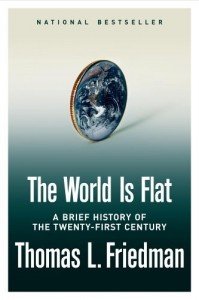I am hearing some good things about Friendman’s book and hope to some day get a chance to read it. Wikipedia has a summary of the ten “flatteners” that Friedman sees as leveling the global playing field:
- #1: Collapse of Berlin Wall–11/’89: The event not only symbolized the end of the Cold war, it allowed people from other side of the wall to join the economic mainstream. (11/09/1989)
- #2: Netscape: Netscape and the Web broadened the audience for the Internet from its roots as a communications medium used primarily by ‘early adopters and geeks’ to something that made the Internet accessible to everyone from five-year-olds to ninety-five-year olds. (8/9/1995). The digitization that took place meant that everyday occurrences such as words, files, films, music and pictures could be accessed and manipulated on a computer screen by all people across the world.
- #3: Workflow software: The ability of machines to talk to other machines with no humans involved. Friedman believes these first three forces have become a “crude foundation of a whole new global platform for collaboration.”
- #4: Open sourcing: Communities uploading and collaborating on online projects. Examples include open source software, blogs, and Wikipedia. Friedman considers the phenomenon “the most disruptive force of all.”
- #5: Outsourcing: Friedman argues that outsourcing has allowed companies to split service and manufacturing activities into components which can be subcontracted and performed in the most efficient, cost-effective way.
- #6: Offshoring: The internal relocation of a company’s manufacturing or other processes to a foreign land in order to take advantage of less costly operations there. China’s entrance in the WTO allowed for greater competition in the playing field. Now countries such as Malaysia, Mexico, Brazil must compete against China and each other to have businesses offshore to them.
- #7: Supply chaining: Friedman compares the modern retail supply chain to a river, and points to Wal-Mart as the best example of a company using technology to streamline item sales, distribution, and shipping.
- #8: Insourcing: Friedman uses UPS as a prime example for insourcing, in which the company’s employees perform services–beyond shipping–for another company. For example, UPS repairs Toshiba computers on behalf of Toshiba. The work is done at the UPS hub, by UPS employees.
- #9: In-forming: Google and other search engines are the prime example. “Never before in the history of the planet have so many people-on their own-had the ability to find so much information about so many things and about so many other people”, writes Friedman. The growth of search engines is tremendous; for example take Google, in which Friedman states that it is “now processing roughly one billion searches per day, up from 150 million just three years ago”.
- #10: “The Steroids”: Personal digital devices like mobile phones, iPods, personal digital assistants, instant messaging, and voice over Internet Protocol (VoIP).



